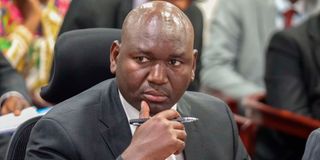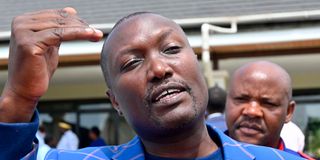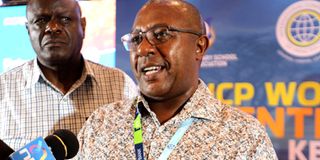
Principal Secretary Education Prof Julius Bitok.
A discussion on the floor of the National Assembly on Wednesday afternoon concerning the disbursement of capitation to schools by the government evolved into revelations about how education officials are allegedly siphoning funds from public schools.
The situation leaves principals and headteachers with no option but to continually send learners home to bring money for activities that are already funded by the government.
The “extortion” spree, according to lawmakers, begins as soon as officials are aware that funds disbursed to schools have reached their accounts. From school inspectors and auditors to various groups claiming to organise school activities, letters begin flooding institutions, demanding money for one reason or another.
The debate was sparked by a response from the National Assembly Education Committee to a question by Deputy Minority Whip Robert Mbui regarding the disbursement of capitation funds.

Deputy Minority Whip Robert Mbui.
The scheme to divert public funds also implicates principals, who reportedly form associations and operate bank accounts outside official school accounts, under the guise of coordinating sports activities. These accounts are not audited, as they are not recognised as official, rendering the use of funds channelled through them questionable.
“They operate accounts, for example, ‘Kilifi Heads Association Sports Activities’. Monies channelled by headteachers through such accounts are not audited,” said Kilifi North MP Owen Baya.

Kilifi North MP Owen Baya.
“I want the Public Accounts Committee to investigate schools. In my constituency, I am aware of this issue. When money is sent to a school, a letter is immediately issued from the sub-county education office demanding a certain amount per student, either ten or five shillings, for various activities,” Mr Baya added.
For instance, the government allocates Sh140 per Junior Secondary School student for co-curricular activities. However, schools are left with only Sh25 per student after remitting Sh85 to the sub-county for coordination, Sh20 to the sub-county office, and Sh10 to the regional association.
School activities are funded at five levels: national, regional, county, sub-county, and zonal.
“There are people getting really rich off school money. This must stop. Funds released by the government must help our children, not enrich individuals,” Mr Baya said.
He added that he had received complaints from headteachers in his constituency who requested anonymity for fear of reprisals from senior education officials at the county and sub-county levels.
“The headteachers are suffering. If a letter is written to you and you fail to comply, you are punished,” Mr Baya said.
Nation journalists saw three such accounts in Kilifi County at a major commercial bank. These included accounts for the coordination of county primary school co-curricular activities and assessments.
Lawmakers questioned why schools are required to remit funds per learner to these associations when the government already provides capitation to cater for related budget lines.
Another suspected avenue for siphoning involves routine inspection visits by education officials, which suspiciously coincide with government disbursements. Some officers have allegedly sought bribes from schools, with headteachers reportedly paying up to Sh50,000 per visit, depending on the school’s level, to secure favourable inspection reports.
Audits are also viewed as a source of extortion. Despite being funded by the ministry, auditors are said to receive up to Sh40,000 from schools to cover their stay -- again, drawing from government funds.
Lawmakers also alleged that part of the capitation is used to fund activities of the Kenya Secondary Schools Heads Association (Kessha).
“Unless Parliament takes decisive steps and requests a special forensic audit of schools and county education offices, our students will continue to suffer and be sent home over trivial and unnecessary demands,” Mr Baya warned.
“What the ministry says here in Nairobi and what is happening on the ground are very different. Parliament must take bold steps to investigate,” he added.
Central Imenti MP Moses Kirima said teachers had developed a habit of sending learners home for levies not recognised under the Basic Education Act.
“When you drive through your constituency, you see children sent home to collect illegal levies,” said Mr Kirima.
He accused both Ministry of Education and Teachers Service Commission officials of being complicit in these practices, which deplete funds meant for schools.
“The ministry should allocate resources for directors when sending them to sub-counties, so they do not demand money from headteachers,” Mr Kirima said.
Education Principal Secretary Prof Julius Bitok told Sunday Nation that no education officer is permitted to solicit funds for examinations, co-curricular activities, or professional associations such as Kessha.
“Financial processes for co-curricular activities and examinations are governed by approved circulars, budgets, and work plans. No officer is allowed to demand funds outside these provisions,” Prof Bitok said.
He said that any engagement with professional associations such as Kessha must be voluntary, transparent, and not funded through capitation unless expressly authorised.
The PS warned that firm action would be taken against any education officer found soliciting funds from schools.
“In accordance with government policy, any officer engaging in unethical or unlawful practices will face disciplinary measures and potential legal action, based on credible evidence,” he said, adding that no formal complaints had yet been lodged with the ministry.

Kenya Secondary School Heads Association Chairperson Willie Kuria addressing journalists in Mombasa during the 2024 International Confederation of Principals World Convention in Mombasa on August 22, 2024.
Mr Willie Kuria, National Chairman of Kessha, said school heads have opened accounts for co-curricular activities but maintained that these are recognised by the Ministry of Education.
“It is true schools contribute to these activities because, at the sub-county level, they are pooled, and the money is used for officials and related expenses,” said Mr Kuria.
The Murang’a High School principal conceded that while the ministry also allocates funds to county and sub-county offices for such activities, officials often claim the allocations are insufficient.
“We have raised this concern, but when we approach county officials, they argue that the money received is inadequate. So we need clarity on how much is actually being disbursed,” Mr Kuria said.
“This money is sent quietly to counties. They should disclose how much is received so we can verify these claims,” he added.
Embakasi West MP Mark Mwenje alleged that the ministry retains half of the funds meant for schools.







